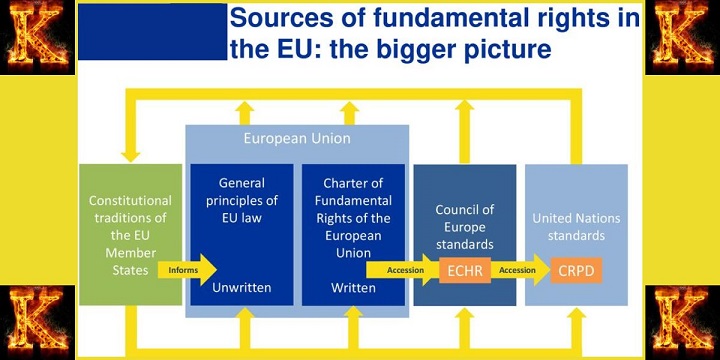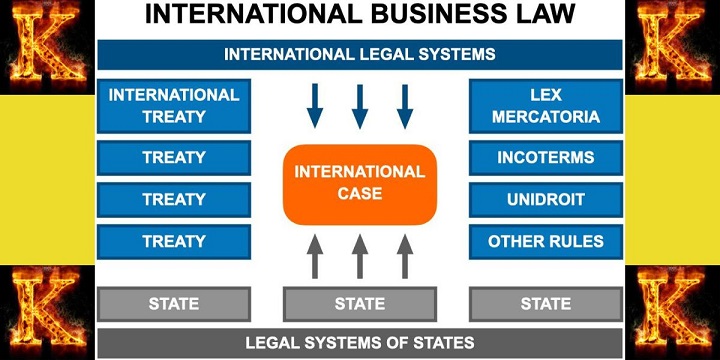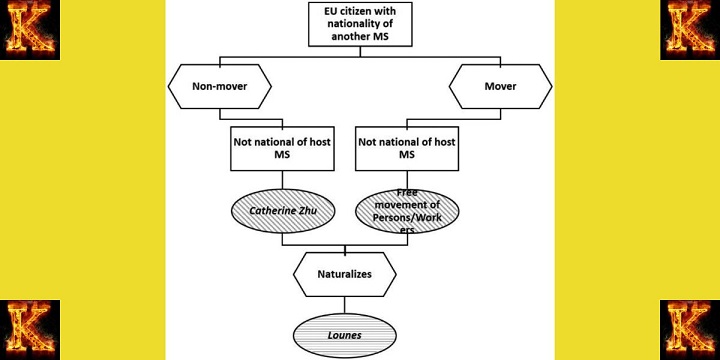Introduction
The legal dispute of "Noël Carnage v Hellenic Republic (Greece)" currently resides within the esteemed European Union's Court of Justice (CJEU), captivating attention for its intricate interplay with fundamental EU law principles. Noël Carnage, a prominent British politician of dual British-French nationality, along with his family, including his British wife, Catherine, and their children, is at the heart of this contentious case. The crux of the matter revolves around Carnage's residency in Greece and the assertions made by the
Hellenic Republic regarding his potential deportation. This case is significant as it delves into the fundamental freedom of movement rights for EU citizens and the potential curtailment of such rights based on grounds asserted by member states.
Parties Involved and Issue
- Parties:
- Plaintiff: Noël Carnage
- Defendant: Hellenic Republic (Greece)
- Key Issues:
- Rights of free movement for Noël Carnage and his family as EU citizens residing in Greece.
- Grounds for potential deportation raised by Greek authorities.
- Background:
- Noël Carnage, a dual British-French national, is renowned as a political commentator focusing on European affairs.
- Despite residing in Greece for three months, the Greek authorities have contested his right to continue staying in the country.
- This dispute has raised concerns regarding potential deportation, sparking a legal conflict between Carnage and the Hellenic Republic.
- The crux of the matter lies in the interpretation of EU laws concerning free movement rights and residency privileges for EU citizens.
- Carnage's case underscores the complexities surrounding the application of EU law within member states and the implications for individuals' rights to reside and work across borders.
- Role of Advocate General:
- As the Advocate General, the objective is to analyze relevant EU laws, case laws, and legal principles to offer informed recommendations to the CJEU concerning the complexities surrounding movement rights and deportation in this case.

Purpose of the Written Opinion
The expressed viewpoint of the General Advocate of the CJEU aims to undertake a comprehensive analysis of the case "Noël Carnage v Hellenic Republic (Greece)." Specifically, it seeks to address two primary issues: the rights of free movement for Noël Carnage and his family as EU citizens in Greece, and the potential application of the "Public Policy" doctrine in justifying his possible deportation. This opinion will rely on pertinent EU laws, precedents, and legal principles to construct well-reasoned arguments and assist the CJEU in reaching an informed decision that upholds the principles of EU law and fundamental rights.
Facts, Conflict, and Reason for the Case
Noël Carnage, a British citizen, has been residing in Greece for the past five years. He is married to Catherine, also a British citizen, and they have two children who hold dual British-French citizenship. Carnage's occupation as a political commentator primarily focuses on European affairs.
The conflict arises from a recent notification by Greek authorities to Noël Carnage, informing him that his continued residency in Greece is untenable due to his wife Catherine's non-EU citizenship. This decision appears to be grounded in the interpretation of EU laws concerning the rights of free movement and EU family residence.
Key Facts:
Noël Carnage, a British citizen, has established residency in Greece for a period spanning five years. Alongside him resides his spouse, Catherine, who shares his British citizenship. The couple has two children, each holding dual citizenship of both Britain and France, a testament to their multinational heritage. Carnage's professional endeavors primarily center around his role as a political commentator, with a particular focus on dissecting and analyzing matters pertaining to European affairs.
-
Noël Carnage:
- Nationality: British
- Residency: Greece (5 years)
- Occupation: Political commentator
-
Spouse: Catherine:
-
Children:
-
Occupation:
- Political Commentator
- Focus: European Affairs
These key facts serve as the foundation for understanding the legal complexities surrounding Carnage's residency status in Greece and the potential implications for his family. They provide crucial context for evaluating the application of EU laws governing movement rights and EU family residence in the ongoing legal dispute.
Nature of Conflict:
The conflict between Noël Carnage and the Greek authorities revolves around the assertion made by the latter, suggesting that Carnage's right to continue residing in Greece could be limited due to his spouse's non-EU citizenship status. This assertion raises questions regarding the compatibility of such restrictions with the principles enshrined in EU law, particularly those concerning the
freedom of movement and EU family residence.
-
Assertion by Greek Authorities:
- Greek authorities contend that Carnage's residency rights in Greece may be subject to limitations based on his spouse's non-EU citizenship status.
-
Impact on Carnage's Residency Rights:
- The assertion challenges the established residency rights of Carnage, an EU citizen, raising concerns about the potential infringement of his rights under EU law.
-
Interpretation of EU Laws:
- Central to the dispute is the interpretation of EU laws governing movement rights and EU family residence.
- The conflict underscores the need for a nuanced understanding of these laws to determine the validity of the Greek authorities' assertion.
-
Freedom of Movement Principle:
- EU law guarantees the freedom of movement for EU citizens within the territory of member states.
- The conflict raises questions about the extent to which restrictions based on marital status are permissible under this principle.
-
EU Family Residence Rights:
- EU law also provides rights concerning family residence, allowing EU citizens to reside with their family members, including non-EU spouses, in member states.
- The conflict highlights the complexities surrounding the application of these rights in Carnage's case.
The resolution of this conflict hinges on a thorough analysis of EU laws governing movement rights and EU family residence. It requires careful consideration of the principles and precedents established by EU law to ensure the protection of Carnage's rights as an EU citizen. Moreover, the outcome of this dispute will have broader implications for the interpretation and application of EU law in similar cases involving the rights of EU citizens to reside and move freely within the EU.

Reason for the Case:
The case of Noël Carnage v Hellenic Republic (Greece) has been brought before the Court of Justice of the European Union (CJEU) to seek clarification and resolution regarding conflicting interpretations of EU laws pertaining to movement rights and residency within the EU.
-
Seeking Clarification and Resolution:
- The case aims to address the ambiguity surrounding the application of EU laws governing movement rights and residency rights for EU citizens residing in member states.
- It seeks clarification from the CJEU to resolve the conflicting interpretations of these laws, particularly in light of the Greek authorities' decision to deny Carnage's right to reside in Greece.
-
Violation of Fundamental Rights:
- At the core of the case lies the question of whether the Greek authorities' decision to deny Carnage's residency rights aligns with EU law or constitutes a violation of his fundamental rights as an EU citizen.
- The case seeks to determine the extent to which member states can impose limitations on the residency rights of EU citizens based on factors such as marital status.
-
Implications for EU Citizens' Rights:
- The outcome of the case carries significant implications for EU citizens' enjoyment of movement rights within the EU.
- It also addresses the broader issue of the extent to which member nations can impose restrictions on residency rights based on grounds such as "Public Policy."
The case underscores the importance of clarifying EU law principles to ensure the protection of fundamental rights and uphold the integrity of the EU legal framework. It aims to provide clarity on the rights of EU citizens to reside in member states and the limitations that member nations can impose on these rights, thereby contributing to the coherence and consistency of EU law interpretation and application.
Constructing a Logical Argument as a General Advocate
The case of Noël Carnage v Hellenic Republic (Greece) presents an opportunity to delve into and provide guidance on two pivotal aspects: movement rights and the legality of the regional court's referral under Article 267 TFEU.
Rights of Free Movement:
i. Noël Carnage's Free Movement Rights:
- Noël Carnage's entitlement to fundamental movement rights within the EU is firmly established by Article 21 of the Treaty on the Functioning of the European Union (TFEU) and the Citizens' Rights Order (2004/38/EC).
- These legal provisions afford Carnage certain residency privileges in Greece, including an initial three-month period, with the possibility of extension granted through mobility rights.
- However, the determination of Carnage's residency rights hinges on the classification of his activities as a political commentator. It is imperative for the court to ascertain whether Carnage's engagement in this role qualifies as self-employment under EU law.
- The classification of Carnage's activities as self-employment could have significant ramifications for his right to stay beyond the initial three-month period. This determination is crucial in understanding the scope of his entitlement to reside in Greece under the protection of EU citizen movement rights.
This assessment underscores the importance of a thorough examination of Carnage's employment status to ensure the proper application of EU law provisions governing residency privileges within the EU.
ii. Rights of Family Members Living with Noël Carnage:
- Directive 2004/38/EC plays a pivotal role in protecting the rights of family members within the European Union.
- This directive establishes crucial provisions to safeguard the rights of family members of EU citizens.
- Family members of EU citizens possess derived rights under Directive 2004/38/EC.
- Derived rights enable family members, regardless of their nationality, to accompany EU citizens to any EU country.
- These rights are essential for ensuring the unity of families and upholding fundamental movement rights within the EU.
- Noël Carnage's wife, Catherine, and their dual British-French citizen children are entitled to reside with him in Greece under the derived rights principle.
- The derived rights principle guarantees that family members can accompany EU citizens and enjoy the same residency privileges.
- In Carnage's case, this principle ensures the preservation of family unity and upholds essential movement rights for his family members.
This elucidation underscores the significance of Directive 2004/38/EC in safeguarding the rights of family members and ensuring their ability to accompany EU citizens across member states, thereby promoting family unity and upholding fundamental movement rights within the European Union.
iii. The Greek Government's Ability to Expel Noël Carnage:
- The Greek authorities contend that Noël Carnage's activities as a political commentator violate "Public Policy" within the EU.
- Allegations against Carnage are based on the assertion that his actions contravene the fundamental interests of society.
- However, it's crucial to note that the "Public Policy" exception is not absolute and must be proportionate to the objective pursued.
- This legal principle ensures that restrictions based on "Public Policy" are justified and balanced against the broader societal interests.
- The burden of proof lies with the Greek authorities to demonstrate that Carnage's activities genuinely pose a significant threat to societal interests.
- They must substantiate their claim and provide compelling evidence to support the allegations against Carnage.
- Ultimately, the validity of Carnage's potential deportation hinges on the Greek authorities' ability to substantiate their claim under the "Public Policy" exception.
- The decision to deport Carnage must be based on a thorough assessment of the evidence and compliance with EU legal principles.
This examination underscores the necessity for the Greek authorities to justify Carnage's potential deportation within the framework of EU law, ensuring that any restriction on his movement rights is proportionate and aligned with the fundamental principles of the European Union.

The Reference's Admissibility Under Article 267 TFEU:
Article 267 TFEU is a cornerstone of the EU legal framework, allowing national courts to request preliminary rulings on matters of EU law from the Court of Justice of the European Union (CJEU).
-
- This provision ensures uniform interpretation and application of EU legislation across member states, promoting legal certainty and consistency.
- Complex Legal Questions:
The case involving Noël Carnage presents intricate legal questions regarding movement rights within the EU and the application of the "Public Policy" exception.
-
- These complexities necessitate expert guidance to ensure a thorough understanding and application of EU law principles.
- Appropriateness of Seeking Guidance:
Given the complexity of the legal issues at hand, the regional court's decision to seek guidance from the CJEU is both appropriate and necessary.
-
- The CJEU's expertise and authority in matters of EU law make it the most suitable authority to provide clarity on the legal intricacies involved.
- Contribution to Legal Development:
The CJEU's response to the reference will not only clarify the interpretation and application of relevant EU laws but also contribute to the ongoing development and refinement of EU law.
-
- By establishing precedents and providing guidance, the CJEU plays a vital role in shaping the legal landscape of the European Union.
- Promotion of Legal Consistency:
The CJEU's rulings set standards for consistent interpretation and application of EU law across member states, promoting legal certainty and upholding the integrity of the EU legal system.
-
- This ensures that EU citizens and entities can rely on a consistent legal framework regardless of their location within the EU.
Conclusion:
This opinion paper underscores the fundamental movement rights enjoyed by Noël Carnage and his relatives as EU citizens, as enshrined in Directive 2004/38/EC and Article 21 TFEU. Their entitlement to reside in Greece is further supported by the derived privileges established in Case C-34/09 Ruiz Zambrano.
-
Movement Rights of Noël Carnage and His Relatives:
- Directive 2004/38/EC guarantees the right of EU citizens to move and reside freely within the territory of the EU.
- The Ruiz Zambrano case extends these rights to family members of EU citizens, ensuring their ability to live together in Greece without undue restriction.
-
Assessment of Potential Deportation:
- The paper recommends a thorough evaluation of the evidence presented by the Greek authorities under the "Public Policy" exception.
- Any restriction on Noël Carnage's right to free movement must be proportionate to the alleged threat posed by his activities as a political commentator.
- Consideration must be given to the impact on his family's life in Greece, ensuring that their rights are not unduly infringed upon.
-
Validity of the Regional Court's Reference:
- The paper affirms the validity of the regional court's reference under Article 267 TFEU.
- Seeking guidance from the CJEU is essential to ensure a consistent interpretation and application of EU law across member states.
- The CJEU's preliminary ruling will assist the national court in resolving legal uncertainties and promoting uniformity in EU law.
-
Balancing Rights and State Interests:
- The court is called upon to strike a balance between preserving the rights of family members and citizens to free migration within the EU and respecting member states' legitimate interests in protecting public policy.
- A well-considered and balanced judgment in this case will establish a crucial precedent for the application of movement rights and the "Public Policy" exception across the European Union.

This comprehensive analysis emphasizes the importance of upholding EU law principles while considering the complex interplay between individual rights and state interests. A judicious decision by the court will not only resolve the immediate dispute but also contribute to the ongoing development of EU law and the promotion of a harmonious legal framework within the European Union.



 This comprehensive analysis emphasizes the importance of upholding EU law principles while considering the complex interplay between individual rights and state interests. A judicious decision by the court will not only resolve the immediate dispute but also contribute to the ongoing development of EU law and the promotion of a harmonious legal framework within the European Union.
This comprehensive analysis emphasizes the importance of upholding EU law principles while considering the complex interplay between individual rights and state interests. A judicious decision by the court will not only resolve the immediate dispute but also contribute to the ongoing development of EU law and the promotion of a harmonious legal framework within the European Union.
